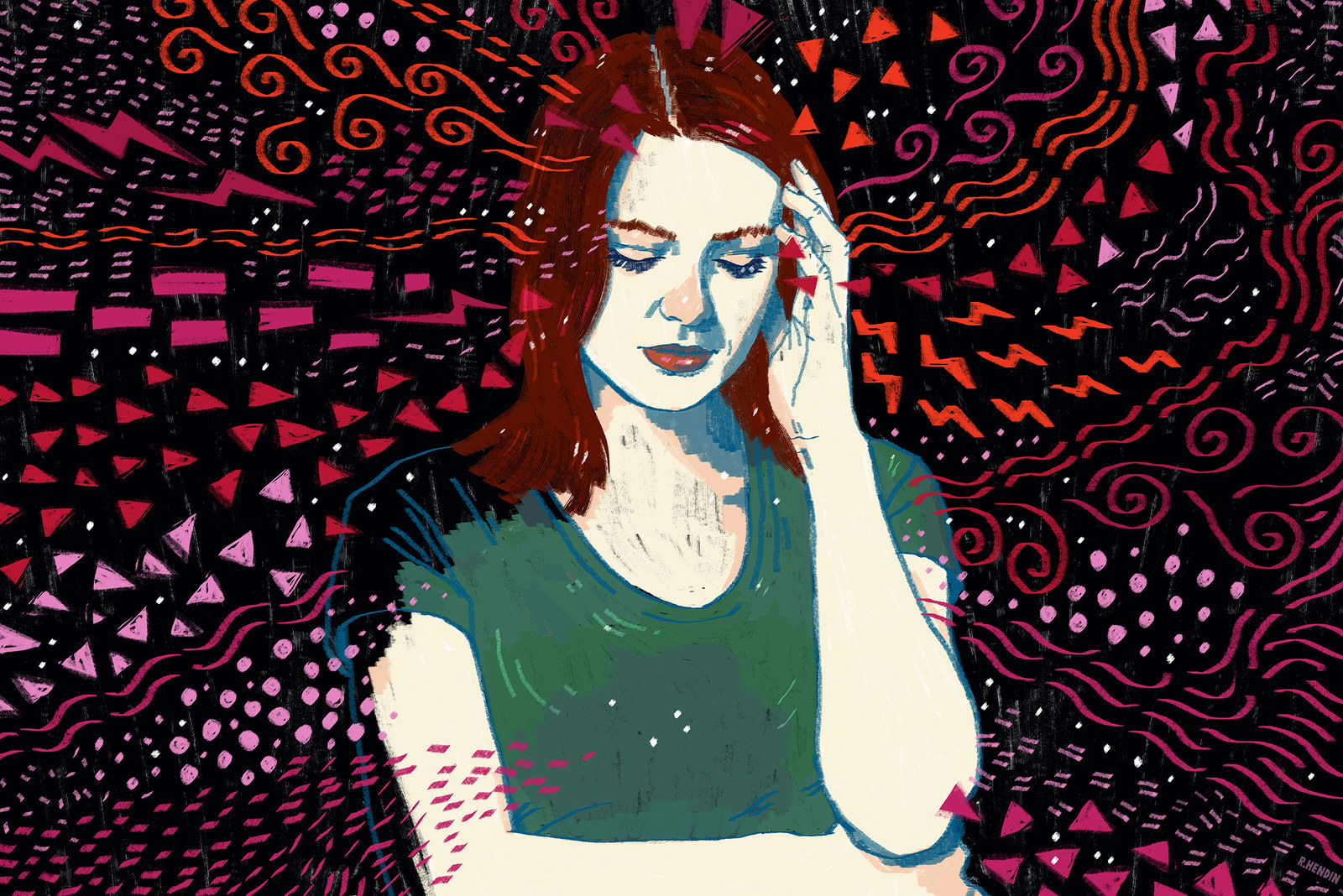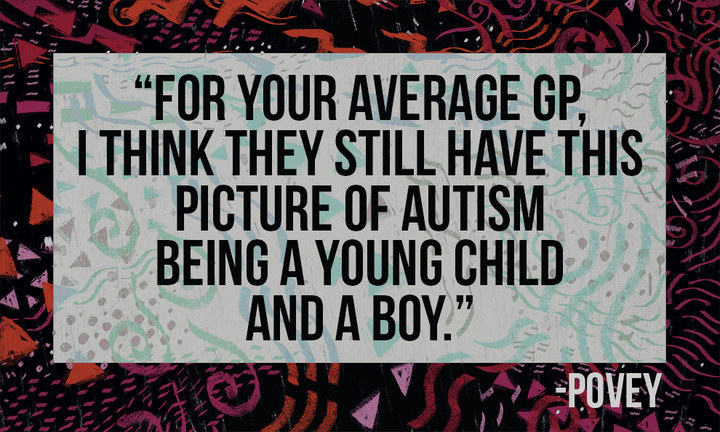(not written by me. And the article was too long to fit into a post, so i have only copy pasted a section of it, from the folowing link http://www.buzzfeed.com/rosebuchana...d-girls?bffbuk&utm_term=.taLp5KLYv#.leqqNLXGK )

Rebecca Hendin / BuzzFeed
“I am quite eloquent, I can chat to people – my job is all about communication and meeting new people every day,” says Emily Swiatek, 29, who was diagnosed with autism spectrum disorder (ASD) last year. “When you look at those surface points, I think [the diagnosis] can be quite hard to understand.”
One in 100 people in the UK have been diagnosed with a form of autism, a lifelong developmental condition that affects social interaction, communication, interests, and behaviour to varying degrees.
Swiatek’s experience of autism contrasts strongly with the common perception of the typical autistic person as an introverted young boy, a perception that is now slowly – too slowly, according to campaigners – beginning to change.
Before her autism diagnosis, Swiatek accumulated a “rubbish bin” of different diagnosed conditions, including borderline personality disorder, an eating disorder, and anxiety. “There was a point where I had about 10 different diagnoses on my file,” she told BuzzFeed News.
Until the signs were finally picked up, Swiatek, who lives in London and has worked as an employment training consultant for an autism charity for four years, was among an unknown number of women in the UK left struggling, sometimes personally and sometimes professionally, without a name for the challenges they face.

Autism is thought to be as much as five times more common in men than women, though new thinking is gradually challenging the level of gender disparity. The ratio could be as close as 2 to 1.
The NHS released a report on autism at the beginning of this year that for the first time discusses addressing the specific needs of autistic women. But Carol Povey of the National Autistic Society (NAS), who contributed to the report, says many in the medical profession still fail to recognise the condition in women.
“I think there is still a long way to go,” Povey says. “For your average GP I think they still have this picture of autism being a young child and a boy.”
The first diagnosed case of autism was Donald Gray Triplett in the United States. Known as “Donald T” or “Case 1”, he was described in a 1943 article announcing the discovery of a then unknown condition that would come to be understood as autism.
At the age of 3, Triplett – who’s now 83 and lives in a town called Forest, Mississippi – was placed in a state-run facility 50 miles from his parents after doctors expressed confusion over his behaviour, including an inability to feed himself.
Triplett was there for a year before his concerned parents, worried by his physical deterioration, removed him. Doctors had few suggestions for what could be at the heart of the issue. The facility director’s assessment was that he probably suffered from “some glandular disease”.
It was through Triplett’s family’s perseverance – helped by their finances and privileged position near the top of Southern US society – that eventually brought the firstborn son of an established banking family to the attention of Johns Hopkins Hospital professor Dr Leo Kanner.
Triplett’s father, a lawyer, sent Kanner a 33-page list describing his son’s conditions. Initially described as “obsessive” by the eminent psychiatrist, the document is commonly recognised as one of the first detailed listing of autism symptoms.
By 1943, Kanner had pulled together another 10 case studies and published in the journal The Nervous Child suggestions for a new condition he called “autistic disturbance of affective contact”. Of the 11 children in the study, only three were girls.
At around the same time, a scientist in Germany was also examining children with similar symptoms. In 1944, Hans Asperger described a “milder” form he had observed in highly intelligent boys.
Both men ascribed “autism” (drawn from the Greek word for self, autòs) to the children under their care, but Asperger categorised his findings, Asperger’s syndrome, as “an extreme variant of the male character” – a finding he later revised based on clinical evidence.
Richard Mills, lead researcher of Research Autism UK, has seen the issue of undiagnosed women on the spectrum come up “again and again” over the years.
Mills, who previously worked for the NAS, says he became aware of the extent of the problem after conducting a study of women in secure hospital units in the early 2000s. “We found an overrepresentation of undiagnosed autistic women,” he says. “That got us thinking, How many had been missed?”
In 2010, Mills and colleagues put on the first conference specifically for women on the spectrum. “We could have filled it 10 times over,” he says, “it was unbelievable.”
Clinicians and experts are only just beginning to realise how differently girls on the spectrum can present compared to boys and how that impacts getting a diagnosis. Mills won’t be drawn on the medical profession, but notes that GPs are often simply “not looking for autism in girls”.
Nicky Clark, 49, a disabilities issues campaigner, parent patron for Ambitious About Autism, and a mother to two daughters diagnosed as on the spectrum, emphasises just how prevalent thinking is of autism being a “male” issue. Clark herself was formally diagnosed as autistic in 2015, aged 48.
Clark, who lives in Shropshire, was shocked at the number of people who suggested the diagnosis was wrong. “It’s this idea that women can’t be autistic,” she told BuzzFeed News. “‘She can’t be autistic because she’s a mother, she can’t be autistic because she’s had a long-lasting relationship. She can’t be autistic because she wears makeup and she’s interested in pop music.’ The nonsense that is said even now is quite staggering.”

Rebecca Hendin / BuzzFeed
“I am quite eloquent, I can chat to people – my job is all about communication and meeting new people every day,” says Emily Swiatek, 29, who was diagnosed with autism spectrum disorder (ASD) last year. “When you look at those surface points, I think [the diagnosis] can be quite hard to understand.”
One in 100 people in the UK have been diagnosed with a form of autism, a lifelong developmental condition that affects social interaction, communication, interests, and behaviour to varying degrees.
Swiatek’s experience of autism contrasts strongly with the common perception of the typical autistic person as an introverted young boy, a perception that is now slowly – too slowly, according to campaigners – beginning to change.
Before her autism diagnosis, Swiatek accumulated a “rubbish bin” of different diagnosed conditions, including borderline personality disorder, an eating disorder, and anxiety. “There was a point where I had about 10 different diagnoses on my file,” she told BuzzFeed News.
Until the signs were finally picked up, Swiatek, who lives in London and has worked as an employment training consultant for an autism charity for four years, was among an unknown number of women in the UK left struggling, sometimes personally and sometimes professionally, without a name for the challenges they face.

Autism is thought to be as much as five times more common in men than women, though new thinking is gradually challenging the level of gender disparity. The ratio could be as close as 2 to 1.
The NHS released a report on autism at the beginning of this year that for the first time discusses addressing the specific needs of autistic women. But Carol Povey of the National Autistic Society (NAS), who contributed to the report, says many in the medical profession still fail to recognise the condition in women.
“I think there is still a long way to go,” Povey says. “For your average GP I think they still have this picture of autism being a young child and a boy.”
The first diagnosed case of autism was Donald Gray Triplett in the United States. Known as “Donald T” or “Case 1”, he was described in a 1943 article announcing the discovery of a then unknown condition that would come to be understood as autism.
At the age of 3, Triplett – who’s now 83 and lives in a town called Forest, Mississippi – was placed in a state-run facility 50 miles from his parents after doctors expressed confusion over his behaviour, including an inability to feed himself.
Triplett was there for a year before his concerned parents, worried by his physical deterioration, removed him. Doctors had few suggestions for what could be at the heart of the issue. The facility director’s assessment was that he probably suffered from “some glandular disease”.
It was through Triplett’s family’s perseverance – helped by their finances and privileged position near the top of Southern US society – that eventually brought the firstborn son of an established banking family to the attention of Johns Hopkins Hospital professor Dr Leo Kanner.
Triplett’s father, a lawyer, sent Kanner a 33-page list describing his son’s conditions. Initially described as “obsessive” by the eminent psychiatrist, the document is commonly recognised as one of the first detailed listing of autism symptoms.
By 1943, Kanner had pulled together another 10 case studies and published in the journal The Nervous Child suggestions for a new condition he called “autistic disturbance of affective contact”. Of the 11 children in the study, only three were girls.
At around the same time, a scientist in Germany was also examining children with similar symptoms. In 1944, Hans Asperger described a “milder” form he had observed in highly intelligent boys.
Both men ascribed “autism” (drawn from the Greek word for self, autòs) to the children under their care, but Asperger categorised his findings, Asperger’s syndrome, as “an extreme variant of the male character” – a finding he later revised based on clinical evidence.
Richard Mills, lead researcher of Research Autism UK, has seen the issue of undiagnosed women on the spectrum come up “again and again” over the years.
Mills, who previously worked for the NAS, says he became aware of the extent of the problem after conducting a study of women in secure hospital units in the early 2000s. “We found an overrepresentation of undiagnosed autistic women,” he says. “That got us thinking, How many had been missed?”
In 2010, Mills and colleagues put on the first conference specifically for women on the spectrum. “We could have filled it 10 times over,” he says, “it was unbelievable.”
Clinicians and experts are only just beginning to realise how differently girls on the spectrum can present compared to boys and how that impacts getting a diagnosis. Mills won’t be drawn on the medical profession, but notes that GPs are often simply “not looking for autism in girls”.
Nicky Clark, 49, a disabilities issues campaigner, parent patron for Ambitious About Autism, and a mother to two daughters diagnosed as on the spectrum, emphasises just how prevalent thinking is of autism being a “male” issue. Clark herself was formally diagnosed as autistic in 2015, aged 48.
Clark, who lives in Shropshire, was shocked at the number of people who suggested the diagnosis was wrong. “It’s this idea that women can’t be autistic,” she told BuzzFeed News. “‘She can’t be autistic because she’s a mother, she can’t be autistic because she’s had a long-lasting relationship. She can’t be autistic because she wears makeup and she’s interested in pop music.’ The nonsense that is said even now is quite staggering.”
Last edited: